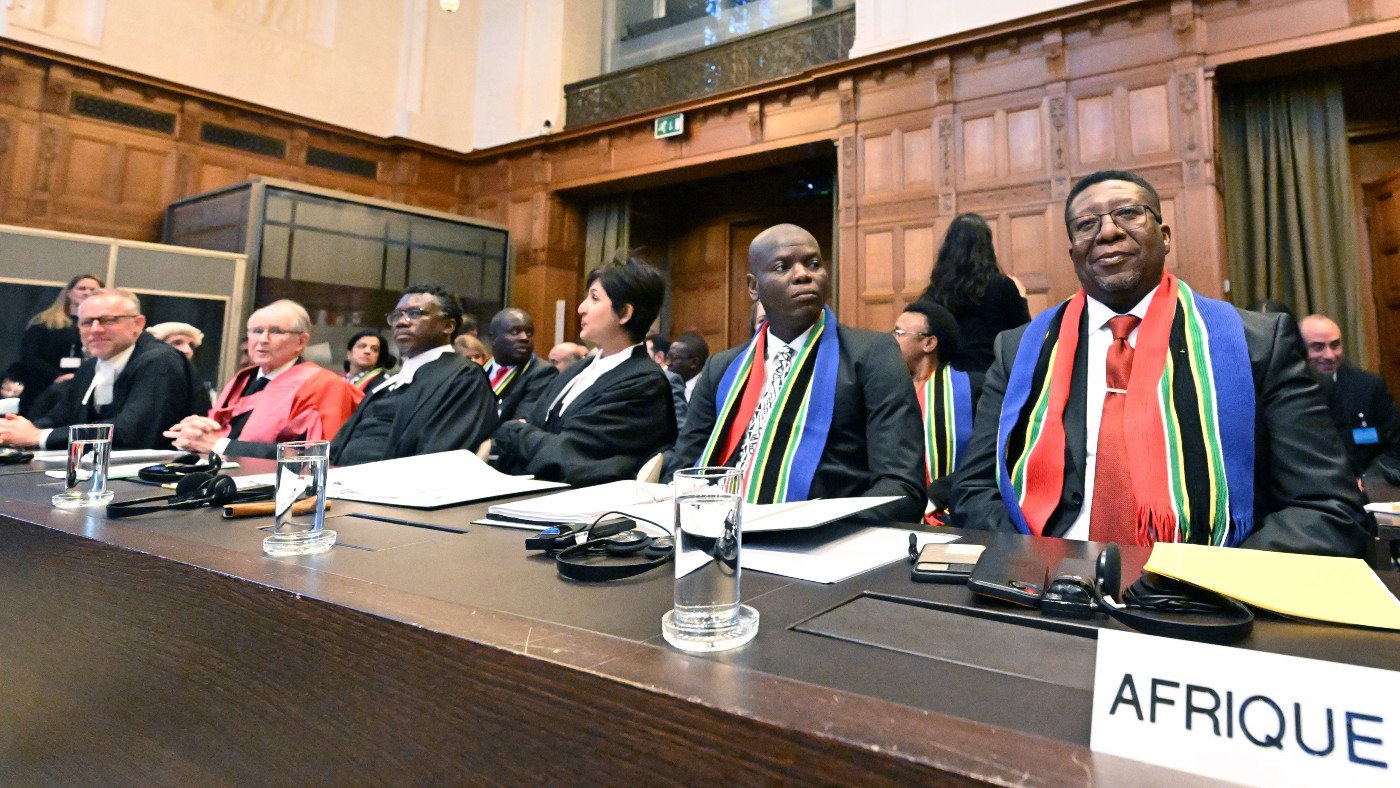South Africa's genocide case puts Israel in the dock
The International Court of Justice in The Hague is hearing a case that could make Israel a 'pariah nation'

A free daily email with the biggest news stories of the day – and the best features from TheWeek.com
You are now subscribed
Your newsletter sign-up was successful
The UN's definition of genocide is simple, said The Guardian: "a crime committed with the intent to destroy a national, ethnic, racial or religious group, in whole or in part". Proving in court that a genocide is happening, however, is anything but.
Last week, South Africa brought just such a case – alleging that Israel is committing genocide against the Palestinians – to the International Court of Justice in The Hague. South Africa's opening petition was compelling, said Rob Howse in the LA Times. Israel's military operations since 7 October have resulted in a vast number of civilian casualties: of the 24,000 killed, according to Palestinian sources, 70% are women and children. More than 1.9 million Gazans have been internally displaced, and supplies of food and water profoundly disrupted.
South Africa's lawyers must also prove "genocidal intent", and to this end they adduced nine pages of statements made by PM Benjamin Netanyahu, President Isaac Herzog, Defence Minister Yoav Gallant and others. To take only one example, Netanyahu has invoked the Biblical tale of Amalek, in which Saul was ordered by God to kill its people, without sparing any. The court was shown video of IDF troops chanting "genocidal" slogans, and cheering what seem to be "acts of indiscriminate destruction".
The Week
Escape your echo chamber. Get the facts behind the news, plus analysis from multiple perspectives.

Sign up for The Week's Free Newsletters
From our morning news briefing to a weekly Good News Newsletter, get the best of The Week delivered directly to your inbox.
From our morning news briefing to a weekly Good News Newsletter, get the best of The Week delivered directly to your inbox.
'Sadistic bad taste'
Genocide was created as a legal concept in the wake of the Holocaust, said Charles Moore in The Daily Telegraph. There is "sadistic bad taste" in using it against the state created to prevent a repetition of such a catastrophe. And invoking it in this context is an obscene "inversion of the truth". As too many people seem keen to forget, Hamas unleashed a genocidal attack on 7 October, killing, maiming and raping as many Jews as possible.
By contrast, "Israel's sole battle aim is to destroy Hamas in Gaza". It tries to avoid civilian casualties, even while fighting an enemy that uses them as human shields. The ICJ will take many months to hear this case, but it can order interim measures such as a ceasefire, if it suspects a genocide is occurring. That would make Israel a "pariah nation", and endanger its ability to defend itself. The case is mere "political theatre", said The Wall Street Journal. Where was South Africa's "moral outrage" when it refused to condemn Russia's invasion of Ukraine, or opposed the indictment of Sudan's genocidal dictator Omar al-Bashir?
'Reckless irresponsible statements'
Such arguments, though, are not relevant to the legal issue, said Kenneth Roth in The Guardian. Hamas's genocidal aims are beside the point, "because atrocities by one side do not justify genocide by another". Israel's lawyers have not yet addressed many issues raised by South Africa: the dropping of 2,000lb bombs in civilian areas; the bloodthirsty rhetoric of its leaders.
If nothing else, Israel's "bigmouth" politicians must learn from this case that "words matter", said Haaretz. Real damage can be caused by "reckless, irresponsible statements". The nation is paying the price.
A free daily email with the biggest news stories of the day – and the best features from TheWeek.com
-
 Samurai: a ‘blockbuster’ display of Japanese heritage
Samurai: a ‘blockbuster’ display of Japanese heritageThe Week Recommends British Museum show offers a ‘scintillating journey’ through ‘a world of gore, power and artistic beauty’
-
 BMW iX3: a ‘revolution’ for the German car brand
BMW iX3: a ‘revolution’ for the German car brandThe Week Recommends The electric SUV promises a ‘great balance between ride comfort and driving fun’
-
 Munich Security Conference: a showdown between Europe and Trump?
Munich Security Conference: a showdown between Europe and Trump?Today’s Big Question Report suggests European leaders believe they can no longer rely on the US for military support – but decoupling is easier said than done
-
 Democrats push for ICE accountability
Democrats push for ICE accountabilityFeature U.S. citizens shot and violently detained by immigration agents testify at Capitol Hill hearing
-
 Fulton County: A dress rehearsal for election theft?
Fulton County: A dress rehearsal for election theft?Feature Director of National Intelligence Tulsi Gabbard is Trump's de facto ‘voter fraud’ czar
-
 ‘Melania’: A film about nothing
‘Melania’: A film about nothingFeature Not telling all
-
 ‘Bad Bunny’s music feels inclusive and exclusive at the same time’
‘Bad Bunny’s music feels inclusive and exclusive at the same time’Instant Opinion Opinion, comment and editorials of the day
-
 Big-time money squabbles: the conflict over California’s proposed billionaire tax
Big-time money squabbles: the conflict over California’s proposed billionaire taxTalking Points Californians worth more than $1.1 billion would pay a one-time 5% tax
-
 Is the Gaza peace plan destined to fail?
Is the Gaza peace plan destined to fail?Today’s Big Question Since the ceasefire agreement in October, the situation in Gaza is still ‘precarious’, with the path to peace facing ‘many obstacles’
-
 Greenland: The lasting damage of Trump’s tantrum
Greenland: The lasting damage of Trump’s tantrumFeature His desire for Greenland has seemingly faded away
-
 Minneapolis: The power of a boy’s photo
Minneapolis: The power of a boy’s photoFeature An image of Liam Conejo Ramos being detained lit up social media